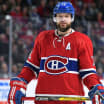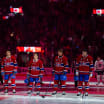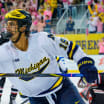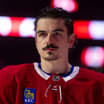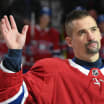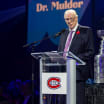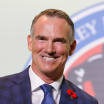By Pierre-Antoine Mercier
It's Game Six of the Ontario Hockey League (OHL) Western Conference finals, and Nick Suzuki and the Guelph Storm are facing elimination for the sixth time in the 2018-19 playoffs.
In the middle of the second period, Suzuki breaks out and goes one-on-one with a Saginaw Spirit defender. He realizes at that exact moment that the only opposing player getting in the way of him and the goalie is forward Owen Tippett.
How many players would have had the reflex, in such a key moment, to take the time to look in front of them and see that it's not a defenseman they're up against, but a forward?
Suzuki certainly did, and this was just one example of many.
To really understand his intelligence, it would help to take a deeper dive into certain elements of his game which form the basis of his hockey IQ.
Creativity
Since a very young age, hockey was a big part of his life. But despite his feats on the ice, Suzuki's parents always imparted the importance of education on him.
For that reason, Suzuki has taken a very different path. Unlike many professional athletes, the Canadiens prospect didn't go to a school known for its athletics programs. Rather, he attended London Waldorf School, a private school specialized in the arts.
Suzuki took the opportunity to work on his artistic side as well as developing the skill of being strong in multiple fields, including painting. He earned high marks throughout his educational career, with the exception of his notorious calculus class.
Looking back, Suzuki is convinced his choice of schooling was hugely beneficial.
"It helps for sure. Thinking outside the box is a great way to be a good hockey player. Just trying to see things that other people don't," explained the 20-year-old forward. "All these kinds of art forms that I've been studying have helped my brain with thinking fast and being precise."
If there's one player who was able to discover Suzuki's creativity over the years in the OHL, it would be defenseman Sean Durzi.
Suzuki and Durzi started their OHL careers together in 2015 with the Owen Sound Attack before both getting traded to the Storm in January. They went on to win the J. Ross Robertson Cup, awarded to the OHL champions, last season.
His former teammate is therefore the perfect source to tap for a full picture of Suzuki's talent.
"He can put the puck in the net like nobody else does. You look at the goals he's scored in the OHL from all areas of the ice. I think he led the league in goals behind the goal line as well," mentioned Durzi, a Los Angeles Kings prospect. "It was really special to play with him because he does everything on the ice."
Vision
It's no state secret that Suzuki's best asset is his vision on the ice. The Vegas Golden Knights' first-round pick (13th overall) in 2017 was named the OHL's Smartest Player by the league's coaches last season.
But well before earning the distinction, Suzuki honed his hockey IQ through various sports such as basketball, volleyball, and soccer. Speaking of soccer, Suzuki played it at a competitive level until he was 14.
The London, ON native believes the beautiful game contributed significantly to improving his vision on the ice.
"Soccer helps a lot. In soccer, you kind of have to read the play before you even get the ball. Placing passes into areas, that really translates on the ice," described the forward, who collected 141 goals and 328 points in 251 career OHL games. "I can see lanes that other people don't. I think soccer helps with that, because you have to play the ball through people into areas for people to run on."
Durzi bore witness to those unimaginable passes on more than a few occasions over the past few seasons. The Toronto Maple Leafs' second-round pick (52nd overall) in 2018 acknowledges that Suzuki can pretty much do it all on the ice.
"It's just the way he sees the ice and the way he made players around him better. Sometimes, it takes a little bit of getting used to playing with Nick because he makes plays you don't expect him to make. That's something that's really special about him," outlined Durzi. "He can make a lot of plays that other players can't. And even when he isn't looking, you have to be ready for him to give you a great pass for a scoring opportunity."
Suzuki doesn't just rack up the points, either. According to his former head coach on the Storm, George Burnett, the future is very promising for Suzuki.
"Nick brings a lot more than just points. He's very calm. He talks very seldomly but when he does, everyone listens," shared Burnett. "He understands the game exceptionally well. He excels in the faceoff dot, he kills penalties, and he blocks shots. He's a very complete player with a bright future ahead of him."
Durzi, for his part, sees that it's not just hockey where Suzuki excels.
"Nick is a really good athlete, and not only a hockey player; he can play any sport as well as almost anyone I know. It's just being that natural athlete, and being able to make plays no matter what he's doing," relayed the Kings prospect. "Sometimes, we play basketball and he is always the best passer. It's really special to have a mind like that in sports. When you're that natural an athlete like he is, it kind of comes natural for hockey."
A historic run
Suzuki was an incredibly important part of Guelph's OHL title run. He finished the playoffs with 16 goals, 26 assists, and 42 points in just 24 games and won the Wayne Gretzky '99' Award as playoff MVP. What's more, Suzuki's 42-point haul set a new playoff record on the Storm.
Since the 2010's, only five players - including Suzuki - have managed to reach the 40-point plateau in the playoffs. It's safe to say the Habs prospect finds himself in good company alongside Connor McDavid (49 points - 2015), Mitch Marner (44 points - 2016), Mark Scheifele (41 points - 2013), and Matthew Tkachuk (40 points - 2016).
Durzi affirms that Suzuki had a major impact on his team's winning the J. Ross Robertson Cup.
"It was unmatchable. He really elevated his game and that's something you try to work on as much as you can to step up in big situations. You try to put pressure on yourself in practice every single day and every single game to prepare yourself for those big moments," explained his good friend. "Growing up in the OHL with Nick, I realize he's got what it takes in those big moments. When the game is on the line, there's probably nobody else I'd rather have on the ice."
Suzuki's performance in the playoffs earned him heaps of praise. The Ottawa 67's head coach, Andre Tourigny, likened the forward to Stanley Cup champion and Conn Smythe and Frank J. Selke trophy winner Ryan O'Reilly.
That's not a comparison the young prospect should shy away from.
"That was very cool. He's kind of from around where I am," recounted Suzuki. "Just everything that he's done throughout his whole career, he's always been a solid two-way forward. He has a lot more skills than I even notice and realize. That's a pretty nice comparison for me."
Suzuki won his own fair share of trophies last season. On top of claiming the J. Ross Robertson Cup and the Wayne Gretzky '99' Award, he was also handed the William Hanley Memorial Trophy which goes to the league's Most Sportsmanlike Player for a third straight season - another OHL record.
Burnett was incredibly proud of his former player and believes it's a well-deserved honor.
"He's very easy to coach. I never had to criticize his work ethic or his preparation. He wants to be used in all situations. The fact he won the sportsmanlike award doesn't mean he isn't competitive. He's a fierce competitor and he works very hard," explained the Storm head coach. "It's quite the accomplishment to win the same trophy in three straight seasons. He deserves to be recognized on many levels."
With his Junior career all wrapped up, what does the future have in store for Nick Suzuki?
"I expect nothing but success for him in the NHL. That's just a credit to his work ethic and the way he loves the game. A lot of this game has to do with having passion. Nick loves the game as much as anyone does."
"He studies it every single day. Every game he watches, he's watching for certain things," concluded Durzi. "If he continues the way he works and studies the game and loves it, I expect nothing but success."


